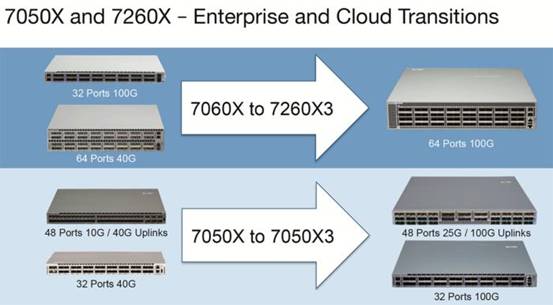Arista’s new line of network switches delivers higher performance and scale to meet the needs of cloud computing providers and cloud-first enterprises.
It can be said that there has never been a stronger dynamic of network evolution than cloud computing. The reason is that cloud computing is a fundamentally different computing paradigm because it enables changes to applications, data, and architecture to be completed immediately. Cloud native infrastructure enables mobile app developers to launch new versions at their discretion.
Cloud computing is network-centric
Another fact
about cloud computing is that it is a network-centric computing model, so poorly performing networks lead to equally poorly performing applications. Lack of network agility means that the DevOps team is hard to succeed, and its network operations change the network.
This has been the driving force behind Arista’s software priorities since the company introduced its products many years ago. Its EOS operating system is designed to be portable, so the company can provide a consistent feature set across different silicon versions without disrupting the network team’s operational processes.
Often companies are delaying the upgrade of their networks because their vendors have made major changes to the operating system and need to update scripts, tools and management systems. But Arista maintains a single operating system in all of its products.
New Arista switches take advantage of the latest Broadcom chip
Arista recently announced two new series of switches that increase network size and performance while maintaining operational consistency.
The Arista 7050X3 and 7260X3 series are fixed-profile, spine and spine products with Broadcom Trident 3 and Tomahawk 2 chips.
The Arista 7050 is more of a universal switch for businesses running highly virtualized and/or containerized data centers. There are two types of products in this series: one switch with 48 25 Gigabit Ethernet ports and 12 100 Gigabit Ethernet uplinks, and the other with 32 100 Gigabit Ethernet ports. It is optimized for complex Layer 2/Layer 3 processing and tunnel encapsulation/break heads and is ideal for implementing the security policies required for server entry networks.
The Arista 7260 is suitable for cloud computing providers or large enterprises with similar requirements and has a 64100 Gig-E port up to 2RU size. It is designed as a data center leaf-spiral switch and optimized for simple Layer 3 processing and tunneling.
These new switches are twice as powerful as the previous generation 7060X and 7050X.

New Features in Arista7050 X3 and 7260 X3 Switches
While the Arista product from the switch to switch operates in a consistent manner, the company has always added new features to its products. This version is no different. Innovations in the 7050 X3 and 7260 X3 include:
• Intelligent buffering and congestion-aware automatic load balancing for consistent network performance
• Advanced packet tracking for path and latency monitoring for faster problem discovery
• Network segmentation, including segmentation Comprehensive VXLAN support for routing and tunneling
• High availability, non-disruptive software upgrades, speed changes, and flexible services, zero downtime
• Up to 12.8Tbps and 4.2Bpps packet forwarding
The new X3 series maintains EOS consistency but adds a variety of features available in the new Broadcom chip. Arista customers can leverage the programmability of the platform to run their own extensions to provide unique features. This provides the benefits of the software without the need to maintain a customized operating system.
Arista’s products are certainly not suitable for every customer. But for those customers who need leading performance and programmability and flexibility, the company uses the latest chips to deliver consistent new product features.




